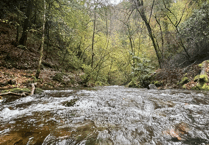MORE than 6,000 crayfish were removed from Burrator Reservoir in a three week period by South West Water as the company steps up its efforts to tackle the invasive American signal crayfish.
American signal crayfish were introduced to the UK decades ago, but have since escaped into the wild.
They bully native wildlife, carry a deadly plague that wipes out the native, white-clawed crayfish, and burrow into riverbanks, making the water muddier and damaging habitats and prey on a wide range of native species.
Burrator is one of the most important reservoirs in the South West, supplying people across Plymouth and parts of South Devon.
So, keeping it clean and healthy is a top priority, SWW says.
The drought of 2022 presented an increased problem with the signal crayfish, but also an opportunity to manage them.
As water levels dropped to around 40% the large population of crayfish became stressed and were more likely to move away from the reservoir.
However, with lower water levels, trapping would be far more effective and South West Water embarked on a unique, large scale trapping programme.
This was repeated in 2023 and 2024 and around 14,000 crayfish have been removed from the reservoir.
South West Water have been setting baited traps, with it latest round at Burrator seeing more than 6,000 crayfish removed in just three weeks. That means fewer big, burly males and far fewer females carrying eggs.
Also, the company has been using underwater cameras to spot crayfish in hard-to-reach places.
Wildlife filmmaker Jack Perks is helping SWW capture footage that gives us a better picture of what’s going on below the surface — and how best to stop it.
Kate Hills, South West Water’s Biosecurity and Invasives Manager, said: ‘Invasive species like the American signal crayfish are a big threat to the balance of our natural ecosystems.
‘They don’t belong here, and their presence puts both wildlife and water quality at risk.
‘They can have a big impact on a water company that’s why we’re doing everything we can to manage them — and it’s working.
‘We have carried out a large scale control programme at Burrator and over three years we have trapped nearly 14,000 crayfish.
‘Anglers say they have already noticed an increase in invertebrate life within the reservoir.
‘We are asking anglers, walkers and visitors to help us stop the spread.
‘If you see the crayfish, let us know.
‘Use wash-down stations, check your kit because the more eyes we have on the water, the better.’
South West Water now plans to start a management programme at Roadford, as well as continuing with the programme at Burrator, the Mid-Devon Advertiser understands.





Comments
This article has no comments yet. Be the first to leave a comment.